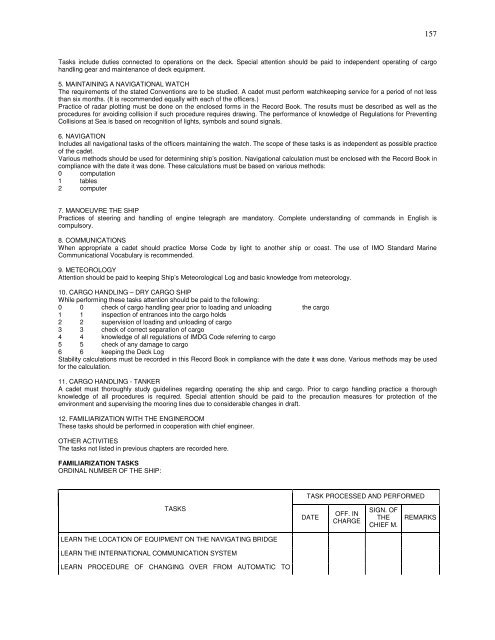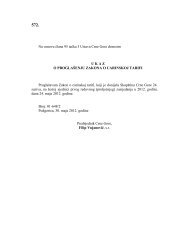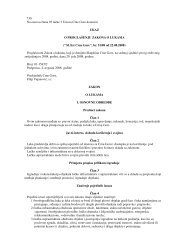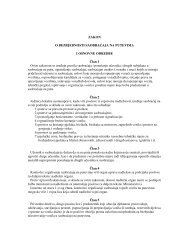pravilnik o zvanjima i ovlaÅ¡Äenjima o osposobljenosti pomoraca
pravilnik o zvanjima i ovlaÅ¡Äenjima o osposobljenosti pomoraca
pravilnik o zvanjima i ovlaÅ¡Äenjima o osposobljenosti pomoraca
You also want an ePaper? Increase the reach of your titles
YUMPU automatically turns print PDFs into web optimized ePapers that Google loves.
157<br />
Tasks include duties connected to operations on the deck. Special attention should be paid to independent operating of cargo<br />
handling gear and maintenance of deck equipment.<br />
5. MAINTAINING A NAVIGATIONAL WATCH<br />
The requirements of the stated Conventions are to be studied. A cadet must perform watchkeeping service for a period of not less<br />
than six months. (It is recommended equally with each of the officers.)<br />
Practice of radar plotting must be done on the enclosed forms in the Record Book. The results must be described as well as the<br />
procedures for avoiding collision if such procedure requires drawing. The performance of knowledge of Regulations for Preventing<br />
Collisions at Sea is based on recognition of lights, symbols and sound signals.<br />
6. NAVIGATION<br />
Includes all navigational tasks of the officers maintaining the watch. The scope of these tasks is as independent as possible practice<br />
of the cadet.<br />
Various methods should be used for determining ship’s position. Navigational calculation must be enclosed with the Record Book in<br />
compliance with the date it was done. These calculations must be based on various methods:<br />
0 computation<br />
1 tables<br />
2 computer<br />
7. MANOEUVRE THE SHIP<br />
Practices of steering and handling of engine telegraph are mandatory. Complete understanding of commands in English is<br />
compulsory.<br />
8. COMMUNICATIONS<br />
When appropriate a cadet should practice Morse Code by light to another ship or coast. The use of IMO Standard Marine<br />
Communicational Vocabulary is recommended.<br />
9. METEOROLOGY<br />
Attention should be paid to keeping Ship’s Meteorological Log and basic knowledge from meteorology.<br />
10. CARGO HANDLING – DRY CARGO SHIP<br />
While performing these tasks attention should be paid to the following:<br />
0 0 check of cargo handling gear prior to loading and unloading the cargo<br />
1 1 inspection of entrances into the cargo holds<br />
2 2 supervision of loading and unloading of cargo<br />
3 3 check of correct separation of cargo<br />
4 4 knowledge of all regulations of IMDG Code referring to cargo<br />
5 5 check of any damage to cargo<br />
6 6 keeping the Deck Log<br />
Stability calculations must be recorded in this Record Book in compliance with the date it was done. Various methods may be used<br />
for the calculation.<br />
11. CARGO HANDLING - TANKER<br />
A cadet must thoroughly study guidelines regarding operating the ship and cargo. Prior to cargo handling practice a thorough<br />
knowledge of all procedures is required. Special attention should be paid to the precaution measures for protection of the<br />
environment and supervising the mooring lines due to considerable changes in draft.<br />
12. FAMILIARIZATION WITH THE ENGINEROOM<br />
These tasks should be performed in cooperation with chief engineer.<br />
OTHER ACTIVITIES<br />
The tasks not listed in previous chapters are recorded here.<br />
FAMILIARIZATION TASKS<br />
ORDINAL NUMBER OF THE SHIP:<br />
TASK PROCESSED AND PERFORMED<br />
TASKS<br />
DATE<br />
OFF. IN<br />
CHARGE<br />
SIGN. OF<br />
THE<br />
CHIEF M.<br />
REMARKS<br />
LEARN THE LOCATION OF EQUIPMENT ON THE NAVIGATING BRIDGE<br />
LEARN THE INTERNATIONAL COMMUNICATION SYSTEM<br />
LEARN PROCEDURE OF CHANGING OVER FROM AUTOMATIC TO







